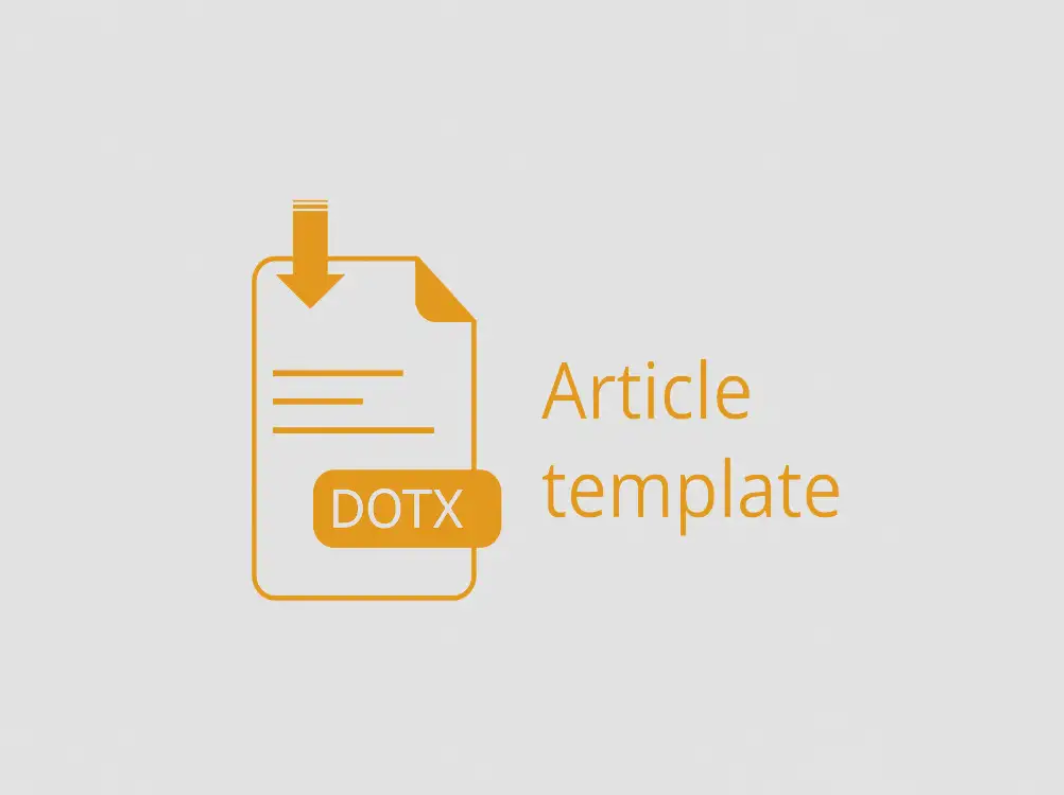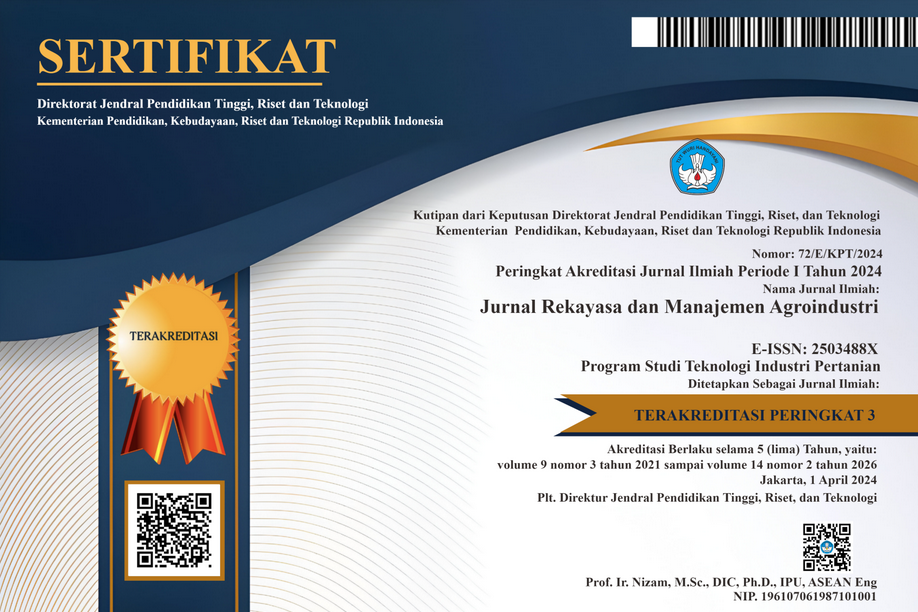Model Penilaian Kinerja Rantai Pasok Hijau Agroindustri Potato Chips
Abstract
The speed and accuracy of fulfilling potato needs in the potato processing industry are needed to anticipate consumer demand. This condition is influenced by the performance of supply chain actors to meet supply needs with good quality continuously. Potatoes are a food ingredient that is widely consumed by the Indonesian people, therefore, it is very important for the potato processing industry to be able to produce quality and safe products. The large number of actors involved in the supply chain and the nature of potatoes as an agricultural product that is easily damaged and will continue to change its quality throughout the supply chain will be an obstacle in controlling the quality and quantity of its supply. The potato chips agroindustry as one of the processed products that uses potatoes as raw materials must also pay attention to its production so as not to use hazardous food additives and above the permitted threshold. Therefore, the implementation of GAP (Good Agricultural Practices) throughout the supply chain of the green potato chips agroindustry is also very important. In an effort to improve the quality of potato chips products and their productivity in a sustainable manner, it is necessary to manage the supply chain in an environmentally friendly manner (green supply chain management). Where in the supply chain activities contribute to the use of carbon footprints released from each process. Improvement/enhancement can be done based on the results of the assessment/measurement of the performance of its supply chain that considers the environment. Thus, the purpose of this study is to identify stakeholders, variables and criteria in the green supply chain of potato chips agroindustry and to develop a model for assessing/measuring its performance. Based on the assessment of the performance of the potato chips supply chain, there are two actors, namely farmer groups which are still relatively low at 77.23% and agroindustry which is classified as medium at 84.29%. Based on the assessment of performance in the procurement business process, it has a high weight in the procurement of raw materials where in the continuity of raw materials needed according to the specifications of raw materials needed by the agroindustry related to the quality of potatoes according to the demand of the agroindustry.
Keywords : Potato chips agroindustry, Performance assessment, Green supply chain, Fuzzy AHP
Kecepatan dan ketepatan pemenuhan kebutuhan kentang di industri pengolahan kentang sangat dibutuhkan untuk mengantisipasi permintaan konsumen. Kondisi ini dipengaruhi kinerja pelaku rantai pasok untuk memenuhi kebutuhan pasokan dengan kualitas yang baik secara kontinu. Kentang merupakan bahan pangan yang banyak dikonsumsi oleh masyarakat Indonesia, oleh karena itu, sangat penting bagi industri pengolahan
kentang untuk dapat menghasilkan produk yang berkualitas dan aman dikonsumsi. Banyaknya pelaku yang terlibat dalam rantai pasok dan sifat kentang sebagai produk hasil pertanian yang mudah rusak dan akan terus berubah mutunya sepanjang rantai pasoknya akan menjadi kendala dalam pengendalian kualitas dan jumlah pasokannya. Agroindustri potato chips sebagai salah satu hasil produk olahan yang menggunakan bahan baku kentang harus pula memperhatikan produksinya agar tidak menggunakan bahan tambahan pangan yang berbahaya dan di atas ambang batas yang diperbolehkan. Oleh sebab itu penerapan GAP (Good Agricultural Practices) sepanjang rantai pasok agroindustri hijau potato chips pun menjadi sangat penting. Dalam upaya untuk meningkatkan kualitas produk potato chips dan produktivitasnya secara berkesinambungan harus melakukan pengelolaan rantai pasoknya secara ramah lingkungan (green supply chain management). Di mana dalam aktivitas rantai pasok memberikan kontribusi terhadap penggunaan carbon footprint yang dikeluarkan dari masing-masing prosesnya. Perbaikan/peningkatan dapat dilakukan setelah berdasarkan hasil penilaian/pengukuran kinerja rantai pasoknya yang mempertimbangkan lingkungan. Dengan demikian tujuan penelitian ini adalah mengidentifikasi stakeholder, variabel dan kriteria dalam rantai pasok hijau agroindustri potato chips serta mengembangkan model penilaian/pengukuran kinerjanya. Berdasarkan penilaian kinerja rantai pasok potato chips ada dua pelaku yaitu kelompok tani masih tergolong rendah sebesar 77,23% dan agroindustri tergolong sedang sebesar 84,29%. Berdasarkan penilaian kinerja pada proses bisnis pengadaan memiliki bobot tinggi dalam pengadaaan bahan baku dimana dalam continuitas bahan baku diperlukan sesuai dengan spesifikasi bahan baku yang dibutuhkan agroindustri terkait mutu kentang sesuai dengan permintaan agroindustri.
Kata kunci : Agroindustri potato chips, Penilaian kinerja, Rantai pasok hijau, Fuzzy AHP
Downloads
References
Darmawan, M. A., Widhiarti, R. P., and Teniwut, Y. K. 2018. Green productivity improvement and sustainability assessment of the motorcycle tire production process: A case study. Journal of Cleaner Production, 191, 273-282.
Decker, G., Dijkman, R., Dumas, M., and García-Bañuelos, L. 2010. The business process modeling notation Modern Business Process Automation (pp. 347-368): Springer.
Effendi, U., Dewi, C., and Mustaniroh, S. 2019. Evaluation of supply chain performance with green supply chain management approach (GSCM) using SCOR and DEMATEL method (case study of PG Krebet Baru Malang). Paper presented at the IOP Conference Series: Earth and Environmental Science.
Huang, Y. A., Weber, C. L., and Matthews, H. S. 2009. Categorization of scope 3 emissions for streamlined enterprise carbon footprinting: ACS Publications.
IPCC. 2013. The Physical Science Basis. IPCC Working Group I Contribution to AR5: Approved Summary for Policymakers: URL: http://www. climate2013. org/spm.
Marimin, M. N. 2010. Aplikasi teknik pengambilan keputusan dalam manajemen rantai pasok. Bogor (ID): Institut Pertanian Bogor.
Marimin, T. D., Hidayat, S., Suharjito, D. N. U., Martini, S., dan Astuti, R. 2013. Teknik dan Analisis Pengambilan Keputusan Fuzzy dalam Manajemen Pasok: PT Penerbit IPB Press.
O’Rourke, D. 2014. The science of sustainable supply chains. Science, 344(6188), 1124-1127.
Pradipta, A. Y., dan Diana, A. 2017. Sistem Penunjang Keputusan Pemilihan Supplier pada Apotek dengan Metode AHP dan SAW (Studi Kasus Apotek XYZ). Prosiding SISFOTEK, 1(1), 107-114.
Pujawan, I, N. 2017. Supply Chain Management Edisi 3: Penerbit Andi.
Saaty, T. L., dan Vargas, L. G. 2001. How to make a decision Models, methods, concepts & applications of the analytic hierarchy process (pp. 1-25): Springer.
Satya, R., and Ismayana, A. 2020. A digital business modelling for post-harvest loses and quality classification of potato agroindustry. Paper presented at the IOP Conference Series: Earth and Environmental Science.
Sofiyessi, E., Marimin, M., Eriyatno, E., and Sutrisno, S. 2019. Agro-industrial supply chain development with cluster system approach: A systematic literature review and future research. International Journal of Supply Chain Management, 8(4), 60-71.
Usman, Y., Fauzi, A., Irawadi, T., and Djatna, T. 2018. Augmented halal food traceability system: Analysis and design using UML. Paper presented at the IOP Conference Series: Materials Science and Engineering.
Van Der Vorst, J. G. 2006. Performance measurement in agri-food supply-chain networks. Quantifying the agri-food supply chain, 15-26.

Ciptaan disebarluaskan di bawah Lisensi Creative Commons Atribusi-BerbagiSerupa 4.0 Internasional.
Seluruh artikel di Jurnal ini dapat disebarluaskan atas tetap mencantumkan sumber yang syah. Identitas judul artikel tidak boleh dihilangkan. Penerbit tidak bertangggung jawab terhadap naskah yang dipublikasikan. Isi artikel menjadi tanggung jawab Penulis.














